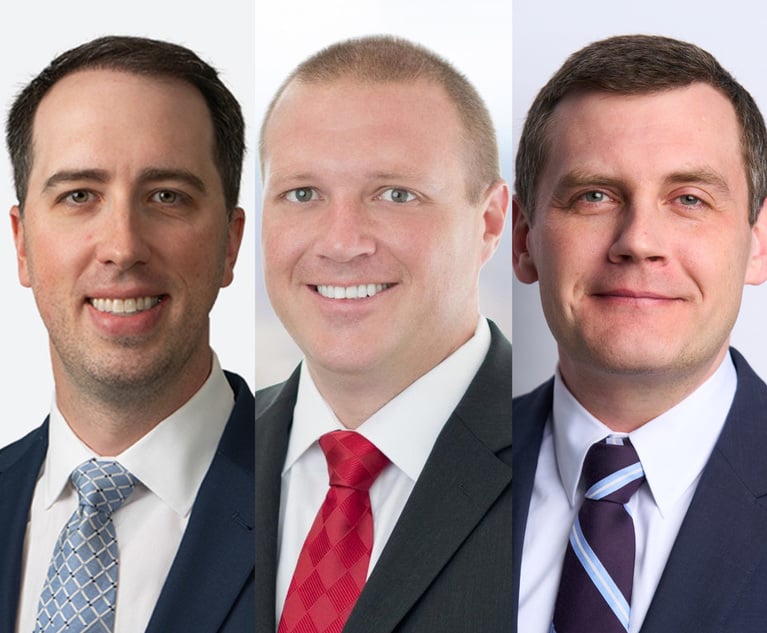 Shari Klevens (left) and Alanna Clair, Dentons. (Courtesy photo)
Shari Klevens (left) and Alanna Clair, Dentons. (Courtesy photo)Amid the December Rush, Lawyers Can Be Thankful
It can be hard to recognize all the opportunities to be thankful for during this season as it pertains to the practice of law.
December 02, 2019 at 02:15 PM
6 minute read
During this time of year, lawyers may be focused on fourth quarter financials and wrapping up loose ends before the holidays and the new year. In addition to the usually demanding workload, some attorneys may even be considering career transitions or struggling to find time to spend with family and friends during the holiday season. Given that attorneys typically work in high stress environments and face daily challenges, it can be hard to recognize all the opportunities to be thankful for during this season as it pertains to the practice of law.
Here are some reasons to be thankful to be a practicing attorney in this modern era.
The Availability of Insurance Policies
One thing lawyers can be thankful for is that professional liability insurance coverage is readily available for attorneys and law firms, and there are more options than ever. Insurance companies recognize that law firms and attorneys' practices can be unique, and law firms are able to customize their coverage.
Law firms and attorneys may consider tailoring the scope of insurance to the particular practice, depending on the scope of practice, the area of practice or the potential benefits for risk management training and other steps. Attorneys can rest assured that insurance companies are thoughtfully considering the complexities of the legal field, adding to the strength of the partnership shared by many firms and their insurers.
Technological Advancements
In this modern era of technology, attorneys have not only reaped the benefits in their personal lives, but their professional lives as well. Smartphones, tablets and laptops are ubiquitous, and their use has been integrated into the daily practice of law. Attorneys may be thankful that it is easier for attorneys to work on the go and even remotely from any place in the world. Gone are the days where an attorney has to entirely cancel a vacation because that attorney must be physically in the office to work on a brief or other project. Evolving technology also makes calendaring and docketing easier and more practical. Further, research tools and trial preparation tools are ever-expanding.
While these technological advances may inspire gratitude, law firms and attorneys may consider steps to ensure that their smartphones, laptops and tablets are protected to guarantee privacy. Most law firms enable IT policies and procedures that:
- Require that attorneys create complex passwords that are changed periodically;
- Implement mandatory training sessions regarding various forms of cyberattacks such as phishing or malware attacks; or
- Require the use of two-factor authentication for virtual private network (VPN) logins for remote access.
In addition, attorneys are encouraged to use strong passwords to make it difficult gain access to their portable devices.
Legal Malpractice Lawsuits Get Due Attention
While attorneys may find it difficult to be thankful when facing legal malpractice lawsuits, attorneys can feel comforted and appreciative that Georgia courts appear to pay close attention when assessing malpractice claims. Indeed, based on the decisions in recent years, Georgia courts continue to appreciate the complexity of legal malpractice lawsuits, and understand the difficult analysis of the "case within a case." Although a layperson may incorrectly assume that the mere existence of a potential breach of the legal duty indicates legal malpractice, courts in Georgia have issued many decisions over the last several years that confirm the understanding that breach, alone, does not equal liability.
Over the last several years, courts in Georgia and other jurisdictions have continued to focus on the plaintiff's burden to prove causation. Attorneys may be thankful that, if they are ever on the receiving end of a claim, they are more likely to be in front a court that will give the issues due consideration.
Multitude of Pro Bono Opportunities
The legal field is one of the few professions that promotes and recognizes pro bono services. The State Bar of Georgia encourages lawyers to provide at least 50 hours of pro bono services each year and contribute financially to legal aid and pro bono programs. To facilitate compliance with that recommendation, the State Bar of Georgia, along with other organizations, has initiated the "Due Justice. Do Fifty" campaign, which has expedited volunteer sign-up and placement and created a website that allows attorneys to select pro bono engagements tailored to one's skills, interests and availability.
The availability of pro bono opportunities is especially beneficial to junior associates seeking ways to gain practical experience (e.g., drafting pleadings, preparing oral arguments and appearing in court) during the early stages of their careers. Attorneys are not only able to supplement their career advancements and contribute to those disadvantaged in society, but law firms can gain further name recognition in the community through this service.
Notwithstanding the ethical (and arguably moral) obligations to give back to the community, law firms will often still take steps to ensure that their internal protocols–such as conflicts procedures–are followed when attorneys accept pro bono assignments. It can also be helpful to use engagement letters to clarify the nature of the services to be provided and for attorneys to confirm that they are insured for pro bono work.
Finally, in accordance with the relevant rules of professional conduct, attorneys are reminded to be professional and treat their peers respectfully, even in contentious matters. Good manners go a long way and prevent the addition of unwarranted frustrations in an already stressful atmosphere. Keeping these things in mind can help attorneys to be thankful that they chose to enter such a highly regarded profession, even in difficult and otherwise contentious matters.
Shari L. Klevens is a partner at Dentons in Atlanta and Washington, D.C., and serves on the firm's U.S. board of directors. She represents and advises lawyers and insurers on complex claims and is co-chair of Dentons' global insurance sector team.
Alanna Clair, also a partner at the firm in Washington, focuses on professional liability and insurance defense. Klevens and Clair are co-authors of "The Lawyer's Handbook: Ethics Compliance and Claim Avoidance" and the 2020 edition of "Georgia Legal Malpractice Law."
This article was completed with assistance by Adeyemi Ojudun, an associate in the Washington, D.C., office of Dentons.
This content has been archived. It is available through our partners, LexisNexis® and Bloomberg Law.
To view this content, please continue to their sites.
Not a Lexis Subscriber?
Subscribe Now
Not a Bloomberg Law Subscriber?
Subscribe Now
NOT FOR REPRINT
© 2024 ALM Global, LLC, All Rights Reserved. Request academic re-use from www.copyright.com. All other uses, submit a request to [email protected]. For more information visit Asset & Logo Licensing.
You Might Like
View All
On The Move: Polsinelli Adds Health Care Litigator in Nashville, Ex-SEC Enforcer Joins BCLP in Atlanta
6 minute read
Akerman Opens Charlotte Office With Focus on Renewable Energy, Data Center Practices
4 minute read

Nelson Mullins, Greenberg Traurig, Jones Day Have Established Themselves As Biggest Outsiders in Atlanta Legal Market
7 minute readLaw Firms Mentioned
Trending Stories
- 1Stock Trading App Robinhood Hit With Privacy Class Action 1 Month After Alleged Data Breach
- 2NY High Court Returns Fired Priest's Discrimination Claim to State Agency
- 3Digging Deep to Mitigate Risk in Lithium Mine Venture Wins GM Legal Department of the Year Award
- 4Reminder: Court Rules and Statutes Apply to Pendente Lite Custody Decisions
- 5Consumer Cleared to Proceed With Claims Against CVS 'Non-Drowsy' Medication, Judge Says
Who Got The Work
Michael G. Bongiorno, Andrew Scott Dulberg and Elizabeth E. Driscoll from Wilmer Cutler Pickering Hale and Dorr have stepped in to represent Symbotic Inc., an A.I.-enabled technology platform that focuses on increasing supply chain efficiency, and other defendants in a pending shareholder derivative lawsuit. The case, filed Oct. 2 in Massachusetts District Court by the Brown Law Firm on behalf of Stephen Austen, accuses certain officers and directors of misleading investors in regard to Symbotic's potential for margin growth by failing to disclose that the company was not equipped to timely deploy its systems or manage expenses through project delays. The case, assigned to U.S. District Judge Nathaniel M. Gorton, is 1:24-cv-12522, Austen v. Cohen et al.
Who Got The Work
Edmund Polubinski and Marie Killmond of Davis Polk & Wardwell have entered appearances for data platform software development company MongoDB and other defendants in a pending shareholder derivative lawsuit. The action, filed Oct. 7 in New York Southern District Court by the Brown Law Firm, accuses the company's directors and/or officers of falsely expressing confidence in the company’s restructuring of its sales incentive plan and downplaying the severity of decreases in its upfront commitments. The case is 1:24-cv-07594, Roy v. Ittycheria et al.
Who Got The Work
Amy O. Bruchs and Kurt F. Ellison of Michael Best & Friedrich have entered appearances for Epic Systems Corp. in a pending employment discrimination lawsuit. The suit was filed Sept. 7 in Wisconsin Western District Court by Levine Eisberner LLC and Siri & Glimstad on behalf of a project manager who claims that he was wrongfully terminated after applying for a religious exemption to the defendant's COVID-19 vaccine mandate. The case, assigned to U.S. Magistrate Judge Anita Marie Boor, is 3:24-cv-00630, Secker, Nathan v. Epic Systems Corporation.
Who Got The Work
David X. Sullivan, Thomas J. Finn and Gregory A. Hall from McCarter & English have entered appearances for Sunrun Installation Services in a pending civil rights lawsuit. The complaint was filed Sept. 4 in Connecticut District Court by attorney Robert M. Berke on behalf of former employee George Edward Steins, who was arrested and charged with employing an unregistered home improvement salesperson. The complaint alleges that had Sunrun informed the Connecticut Department of Consumer Protection that the plaintiff's employment had ended in 2017 and that he no longer held Sunrun's home improvement contractor license, he would not have been hit with charges, which were dismissed in May 2024. The case, assigned to U.S. District Judge Jeffrey A. Meyer, is 3:24-cv-01423, Steins v. Sunrun, Inc. et al.
Who Got The Work
Greenberg Traurig shareholder Joshua L. Raskin has entered an appearance for boohoo.com UK Ltd. in a pending patent infringement lawsuit. The suit, filed Sept. 3 in Texas Eastern District Court by Rozier Hardt McDonough on behalf of Alto Dynamics, asserts five patents related to an online shopping platform. The case, assigned to U.S. District Judge Rodney Gilstrap, is 2:24-cv-00719, Alto Dynamics, LLC v. boohoo.com UK Limited.
Featured Firms
Law Offices of Gary Martin Hays & Associates, P.C.
(470) 294-1674
Law Offices of Mark E. Salomone
(857) 444-6468
Smith & Hassler
(713) 739-1250






